
SYSTEMATIC PARASITOLOGY
metrics 2024
Exploring the intricate relationships between parasites and hosts.
Introduction
SYSTEMATIC PARASITOLOGY, a premier academic journal published by Springer, serves as a vital resource in the field of parasitology. Since its inception in 1979, this journal has committed itself to advancing the understanding of parasitic organisms and their interactions with hosts, thus playing a significant role in both basic and applied research. With an impactful contribution to the scientific community—evidenced by its Scopus ranking and its position in the third quartile (Q3) within the Parasitology category—the journal provides a platform for high-quality, peer-reviewed research that spans a variety of topics from molecular biology to ecology. Although not currently open access, SYSTEMATIC PARASITOLOGY remains essential for researchers, professionals, and students who seek to stay at the forefront of parasitological studies and contribute to ongoing developments in the domain. Published in the Netherlands, it continues to attract a diverse international readership, fostering a collaborative scientific environment.
Metrics 2024
 0.38
0.38 1.00
1.00 1.00
1.00 55
55Metrics History
Rank 2024
Scopus
IF (Web Of Science)
JCI (Web Of Science)
Quartile History
Similar Journals
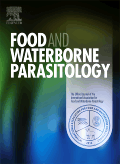
Food and Waterborne Parasitology
Elevating Research on Parasitic Threats to Food and WaterFood and Waterborne Parasitology is a premier open-access journal published by ELSEVIER, dedicated to the critical study of parasites affecting food and water safety. Since its inception in 2015, the journal has significantly contributed to research in the fields of epidemiology, food science, and parasitology, achieving impressive rankings in its categories with a Q1 status in Food Science and a Q2 in both Epidemiology and Parasitology as of 2023. Addressed from RADARWEG 29, 1043 NX Amsterdam, Netherlands, it garners attention for its accessible content, aiming to elevate the understanding of the impact of parasitic organisms on public health and food security. With its open-access model, the journal enhances visibility and dissemination of research findings, fostering collaboration and innovation among researchers, professionals, and students alike. By bridging scientific inquiry with practical applications, Food and Waterborne Parasitology plays a pivotal role in addressing global health challenges and advancing knowledge in this vital area of study.
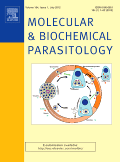
MOLECULAR AND BIOCHEMICAL PARASITOLOGY
Advancing the Science of Parasites at the Molecular Level.MOLECULAR AND BIOCHEMICAL PARASITOLOGY is a renowned journal published by Elsevier, focusing on the crucial intersections of molecular biology and parasitology. Since its inception in 1980, this journal has aimed to advance our understanding of parasitic organisms at the biochemical and molecular levels, providing a dedicated platform for researchers studying host-parasite interactions, parasite genetics, and diagnostic methodologies. Although it currently holds a quartile status of Q4 in Molecular Biology and Q3 in Parasitology for the year 2023, it remains a vital resource within the academic community, boasting a variety of research articles, reviews, and case studies that explore innovative treatment strategies and the molecular biology of parasites. Researchers and students alike can benefit from the journal's contributions to the field, despite its traditional publishing model, as the content remains pivotal for ongoing studies and advancements in parasitology.
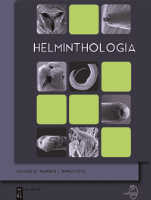
HELMINTHOLOGIA
Exploring the Intricacies of Helminths and Their HostsHELMINTHOLOGIA is a distinguished open-access journal published by SCIENDO, dedicated to advancing our understanding of parasitology and its relationship with animal science. Since its establishment in 1979, this journal has been a vital resource for researchers, professionals, and students in the fields of Animal Science and Zoology as well as Parasitology, featuring comprehensive research articles that span a diverse array of topics pertaining to helminths and their impact on host organisms. With an impressive impact factor and a commendable ranking in both Scopus categories (Rank #275 in Animal Science and Zoology and Rank #55 in Parasitology), it serves as a crucial platform for disseminating knowledge that informs both academic inquiry and practical application. Operating out of Poland, HELMINTHOLOGIA has embraced an open-access model since 2006, ensuring that its content is readily available to a global audience, thereby fostering collaboration and innovation in parasitic research.
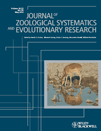
JOURNAL OF ZOOLOGICAL SYSTEMATICS AND EVOLUTIONARY RESEARCH
Connecting the Dots of Animal Science and EvolutionThe Journal of Zoological Systematics and Evolutionary Research, published by Wiley-Hindawi, stands as a premier academic journal since its establishment, showcasing cutting-edge research in the fields of Animal Science, Zoology, and Ecology. With an impressive track record spanning from 1963 to the present, this journal has earned a Q1 classification in both Animal Science and Ecology, as well as recognized rankings in Genetics and Molecular Biology. Its impact is highlighted by its Scopus ranks, placing it in the top percentile for relevant categories, underscoring its vital role in advancing knowledge and understanding within these disciplines. Researchers, professionals, and students will find a wealth of high-quality, peer-reviewed articles that contribute to the evolutionary understanding of biodiversity and systematics. Though not an Open Access journal, it remains accessible to a wide audience committed to exploring the intricacies of zoology and evolutionary biology.
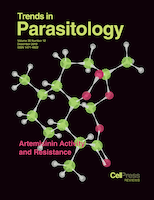
TRENDS IN PARASITOLOGY
Exploring the dynamics of infectious diseases.TRENDS IN PARASITOLOGY is a premier academic journal published by CELL PRESS, focusing on the dynamic field of parasitology and infectious diseases. With an ISSN of 1471-4922, this esteemed journal is recognized for its high impact within the research community, boasting a Q1 ranking in both the Infectious Diseases and Parasitology categories as of 2023. This places it among the top-tier journals in the field, as evidenced by its remarkable Scopus rankings, where it ranks #3 out of 79 in Parasitology and #29 out of 344 in Infectious Diseases. Spanning over two decades of scholarly contributions from 2001 to 2024, TRENDS IN PARASITOLOGY emphasizes the latest advancements, challenges, and innovative methodologies in parasitology, making it an invaluable resource for researchers, healthcare professionals, and students alike. With an increasing focus on open access initiatives, this journal not only promotes widespread dissemination of knowledge but also encourages collaboration across the global scientific community. Whether you are investigating novel interventions, exploring parasite evolution, or understanding host-pathogen interactions, TRENDS IN PARASITOLOGY remains at the forefront of research, driving forward the understanding of parasitic diseases.

Journal of Insect Biodiversity
Unveiling the Secrets of BiodiversityJournal of Insect Biodiversity, published by MAGNOLIA PRESS in New Zealand, offers a vital platform for researchers and professionals interested in the intricate world of insect science. Established in 2019, this journal covers a wide array of topics within its field, focusing on the ecological, evolutionary, and behavioral aspects of insects, while also engaging with paleontological perspectives. With an impressive Q2 and Q3 categorization in multiple ecological disciplines and a growing influence in the Scopus rankings, it serves as an essential resource for scholars aiming to deepen their understanding of insect diversity and its implications for ecosystems. The journal is committed to open access, promoting the dissemination of knowledge without barriers. Researchers, students, and professionals alike will benefit from the timely contributions this journal offers as it continues to reflect the dynamic and evolving nature of insect research up to the year 2024.
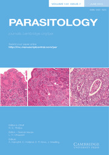
PARASITOLOGY
Exploring innovative insights into infectious diseases.PARASITOLOGY, published by Cambridge University Press, is a prestigious journal that has been at the forefront of research in the field of parasitology since its inception in 1908. This esteemed publication carries the ISSN 0031-1820 and E-ISSN 1469-8161, and its rigorous peer-reviewed articles provide insights into both fundamental and applied aspects of parasitic biology, infectious diseases, and host-parasite interactions. With a commendable impact factor, PARASITOLOGY ranks in the top quartile (Q1) for Animal Science and Zoology and holds Q2 rankings in both Infectious Diseases and Parasitology categories, indicating its significant influence and contribution to these disciplines. The journal's diverse scope allows for a broad range of research articles, reviews, and case studies, making it an essential resource for researchers, professionals, and students seeking to stay updated on the latest developments in the field. Based in the United Kingdom, PARASITOLOGY offers valuable access to critical research in an era where understanding parasitic diseases is more vital than ever, and continues to shape the future of this important scientific field.
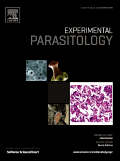
EXPERIMENTAL PARASITOLOGY
Advancing Knowledge in Parasite Biology and ImmunologyEXPERIMENTAL PARASITOLOGY, published by Academic Press Inc Elsevier Science, is a prominent journal in the domains of immunology, infectious diseases, and parasitology, with roots extending back to 1951. This journal, bearing the ISSN 0014-4894 and E-ISSN 1090-2449, serves as a critical conduit for sharing advancements in the understanding of parasite biology, host-parasite interactions, and the immunological responses elicited by parasitic infections. Although it currently operates under a subscription model without open access options, its rigorous scholarly content is vital for researchers and practitioners alike looking to stay informed on the latest developments and applications in the field. With a recent categorization as Q3 in key scientific categories, including Infectious Diseases and Parasitology, and a Scopus ranking solidifying its relevance, EXPERIMENTAL PARASITOLOGY is an essential resource for those committed to advancing knowledge and solutions to parasitic diseases.
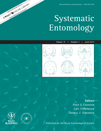
SYSTEMATIC ENTOMOLOGY
Advancing the Frontiers of Insect KnowledgeSYSTEMATIC ENTOMOLOGY is a premier journal published by Wiley, specializing in the field of entomology with a particular focus on insect systematics, ecology, evolution, and behavior. With its strong academic reputation, this journal has achieved a remarkable Q1 ranking in both Ecology, Evolution, Behavior and Systematics and Insect Science categories, affirming its influence and importance in advancing research in these critical areas. SYSTEMATIC ENTOMOLOGY has a broad scope, making it a valuable source for original research, reviews, and methodological advancements that contribute to the understanding of insect biodiversity and systematics. Operating from the United Kingdom, the journal is dedicated to fostering knowledge and innovation within the scientific community, ensuring that high-quality research is accessible to researchers, professionals, and students alike. The journal's consistent publication since 1976 and its continued relevance up to 2024 exemplify its commitment to the field and its readers.
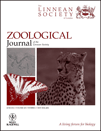
ZOOLOGICAL JOURNAL OF THE LINNEAN SOCIETY
Connecting past discoveries with future innovations in ecology.Zoological Journal of the Linnean Society, published by Oxford University Press, stands as a prestigious vessel for scholarly discourse in the fields of Animal Science and Ecology. With an ISSN of 0024-4082 and E-ISSN 1096-3642, this journal has an illustrious history dating back to its inception in 1866, and has consistently contributed groundbreaking research that shapes our understanding of zoology and evolutionary biology. Operating out of the United Kingdom, the journal boasts an impressive Q1 ranking in both Animal Science and Zoology and Ecology, Evolution, Behavior and Systematics, positioning it among the top tier of its category. With a significant presence in the academic landscape, the journal ranks 24th among 490 in Animal Science and 97th among 721 in Ecology, reflecting its impact and relevance in the field. Although it is not an open access journal, the wealth of knowledge it offers is invaluable for researchers, professionals, and students alike, aiding in the advancement of zoological sciences.